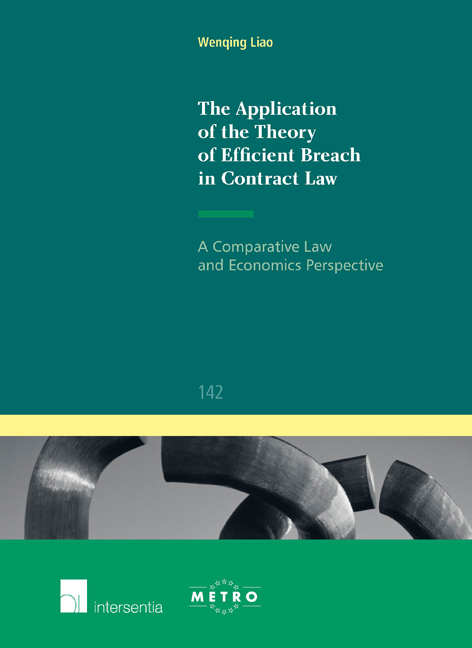 The Application of the Theory of Efficient Breach in Contract Law
The Application of the Theory of Efficient Breach in Contract Law Published online by Cambridge University Press: 12 December 2017
In the beginning of this chapter, a brief summary of the entire thesis is provided. After restating the subject question as well as the basic presumptions (section 1.1), this chapter summarizes what has been discussed and found by each chapter. Implications and policy recommendations will be formulated next (section 2). It is recognized that this thesis has many limitations as well, such as its lack of empirical statistics, ignorance of other types of contracts, and an insufficient consideration of legal rules beyond contract law (section 3).
Summary
Summary of Research Questions
The doctrine of efficient breach is grounded on an assumption that actors are economically rational and their acts are motivated primarily by economic profit. This is particularly the case in commercial sales where both of the parties are businessmen whose acts are to a large degree driven by economic concerns. As a result, they will perform the contract only when theeconomicsurplusofperformanceislargerthanthatofbreach. Economists have also been aware that every actor has limited rationality and foresight. Within a context where transaction costs are unavoidable, it is either impossible or too costly for people to consider every potential contingency that might arise within their on-going transactions. In the absence of perfect and complete contracts in addition to a well operating market mechanism, there is a possibility that people may choose non-cooperation such as opportunism which may decrease social welfare. This creates a demand for contract law. It is assumed that the introduction of contract law may alter people's incentives by switching a non-cooperating relationship into a cooperating relationship. Against this background, law and economic scholars have come up with their theory of efficient breach. According to this theory, legal rules should align trading parties’ incentives with the social welfare and more particularly shape people's incentives to breach only when it is efficient to do so. An important mechanism for adjusting people's incentives to perform and breach a contract refers to remedy rules which may increase the cost of breach. The remedy of expectation damages is considered to be able to accomplish this goal best since it prices a breach at a reasonable level. The damages paid by a breacher will put the non-breaching party in the position that he would enjoy as if the contract had been performed.
To save this book to your Kindle, first ensure [email protected] is added to your Approved Personal Document E-mail List under your Personal Document Settings on the Manage Your Content and Devices page of your Amazon account. Then enter the ‘name’ part of your Kindle email address below. Find out more about saving to your Kindle.
Note you can select to save to either the @free.kindle.com or @kindle.com variations. ‘@free.kindle.com’ emails are free but can only be saved to your device when it is connected to wi-fi. ‘@kindle.com’ emails can be delivered even when you are not connected to wi-fi, but note that service fees apply.
Find out more about the Kindle Personal Document Service.
To save content items to your account, please confirm that you agree to abide by our usage policies. If this is the first time you use this feature, you will be asked to authorise Cambridge Core to connect with your account. Find out more about saving content to Dropbox.
To save content items to your account, please confirm that you agree to abide by our usage policies. If this is the first time you use this feature, you will be asked to authorise Cambridge Core to connect with your account. Find out more about saving content to Google Drive.